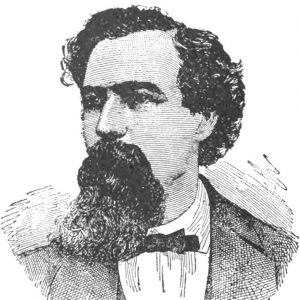calsfoundation@cals.org
Ozro Amander Hadley (1826–1915)
Ozro Amander Hadley served as acting governor of Arkansas from 1871, when Powell Clayton resigned, until 1873. His two years in office saw a continuation of Clayton’s policies but without the extreme violence that had marked his predecessor’s years. Hadley played several other roles of note both before and after his term in office
O. A. Hadley was born on June 26, 1826, at Cherry Creek in Chautauqua County, New York, to Alvah Hadley and Eunice Bates Hadley. His father was a farmer. Hadley was educated in local public schools and at the Fredonia Academy. On February 17, 1849, he married Mary C. Kilbourn; they had two daughters, as well as one child who died in infancy. The ill heath of Hadley’s father left him responsible for his mother and two sisters. In addition to farming, he worked in insurance.
In 1855, he moved to Rochester, Minnesota, where he became the Olmsted County auditor. He held that office until 1865, when as he put it, he “followed the tide of emigration South,” settling in Little Rock (Pulaski County), where he opened a mercantile and commission business. Originally a Whig in politics, he early joined the Republican Party.
Although his first business venture in Little Rock failed, he had more success in politics. Elected in 1868 to the Seventeenth General Assembly, he represented Pulaski and White counties. His re-election bid in 1870 was disputed, and at first he was denied a seat in the Eighteenth General Assembly. However, the Clayton faction prevailed, and he reclaimed his seat. A strong supporter of Governor Powell Clayton, Hadley served as Clayton’s agent for funding the new state bonds in the North. A strong supporter of higher education, he championed St. Johns’ College, the Masonic school in Little Rock, and attempted, in vain, to muster support in Pulaski County and Little Rock for securing the state university.
Hadley’s emergence as governor came after a complex series of maneuvers. Clayton wanted one of his supporters to succeed him. Lieutenant Governor James M. Johnson was induced to resign his office and take the recently vacated office of secretary of state. This left the gubernatorial succession to Hadley, then the president pro tempore of the state Senate. Hadley was sworn in on March 17, 1871, and served until January 6, 1873.
Hadley’s term was relatively quiet. He acted in concert with leading ex-Confederates in defusing the Pope County Militia War. Perhaps the biggest scandal of his administration was the appointment of William F. Roberts of Pennsylvania as state geologist. State Senator James Gordon Frierson blasted the “deceitful, hypercritical, law-breaking, constitution-violating” governor for having paid $15,000 to a man who “came, got drunk on the night of his arrival at Little Rock, continued drunk during the entire time he remained in the state.” Roberts was paid in state scrip rather than national currency, so that the actual cost was substantially less.
Upon the completion of Hadley’s term, the Clayton faction nominated Elisha Baxter. Baxter became the nominal winner over Joseph Brooks but soon offended the members of his faction. Baxter vetoed some key railroad bills on March 16, 1874, leading Clayton to make a deal with Brooks that initiated the Brooks-Baxter War.
Following a hastily called court hearing, Baxter was evicted from the capitol on April 15, 1874, by the newly sworn-in governor, Brooks. Hadley, meanwhile, spent a year in Europe, thus missing the imbroglio. His first reward from Clayton in 1875 was his appointment as registrar of the United States land office in Little Rock; this was followed by being made Little Rock’s postmaster, a position he held from June 6, 1877, to the end of 1881. Home delivery began during his term of office.
Hadley also had some influence as an agricultural promoter. After the end of his term of office, he bought extensive acreage in Lonoke County’s Grand Prairie. Besides a race course, the place sported “plank fences,” a rarity at that time in Arkansas, and quality English cattle. In 1882, he followed his son-in-law, Keyes Danforth, the former state adjutant-general, to Colorado, where he again engaged in cattle raising, an activity he continued next near Watrous, New Mexico. His wife died there on June 11, 1903. In 1910, he moved to Los Angeles, where one of his daughters lived. Hadley died there on July 18, 1915.
For additional information:
Donovan, Timothy P., Willard B. Gatewood Jr., and Jeannie M. Whayne, eds. The Governors of Arkansas: Essays in Political Biography. 2nd ed. Fayetteville: University of Arkansas Press, 1995.
O. A. Hadley Papers. Arkansas State Archives, Little Rock, Arkansas.
Speer, William S., and John Henry Brown. The Encyclopedia of the New West. Easley, SC: Southern Historical Press, 1978.
Michael B. Dougan
Jonesboro, Arkansas






Comments
No comments on this entry yet.